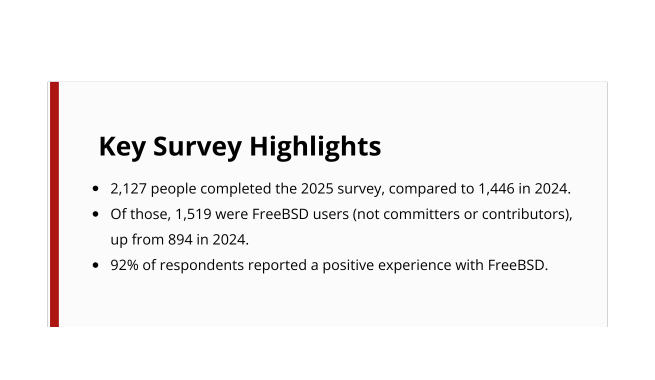 Thanks to everyone who took part in the 2025 FreeBSD Community Survey! As with last year, the FreeBSD Core Team and the FreeBSD Foundation brought in the research firm Research Collaborative to not only create the survey, but also analyze the results. Your feedback gave us a clear picture of how FreeBSD is being used today, the challenges people face, and where the project can improve. The best part? Much of what you asked for is already in progress through the work of the FreeBSD Core Team and the Foundation. Take a look at what stood out:
Thanks to everyone who took part in the 2025 FreeBSD Community Survey! As with last year, the FreeBSD Core Team and the FreeBSD Foundation brought in the research firm Research Collaborative to not only create the survey, but also analyze the results. Your feedback gave us a clear picture of how FreeBSD is being used today, the challenges people face, and where the project can improve. The best part? Much of what you asked for is already in progress through the work of the FreeBSD Core Team and the Foundation. Take a look at what stood out:
Contributor Experience: Making It Easier to Get Started
A big theme was the contributor experience. Many of you said onboarding and review delays can make it tough to get started. That’s something we’ve been tackling by moving from Subversion to Git, improving GitHub workflows, creating better onboarding materials, updating the Handbook, and expanding mentorship opportunities through working groups and Google Summer of Code.
Tailoring FreeBSD for Different Use Cases
Another key takeaway was that different use cases need different support. FreeBSD powers everything from servers and cloud platforms to laptops, desktops, and appliances—and each has its own priorities. Ongoing work is strengthening CI/CD and security for cloud and servers, improving usability for laptops and desktops, and continuing to enhance ZFS and performance for storage and network appliances.
Upgrades: Smoother, Safer, and More Predictable
Upgrades were also called out as a pain point, especially for users managing many systems. We’ve been making upgrades smoother and safer with better tooling to catch conflicts early, more testing through CI and release cycles, and clearer communication about timelines and upgrade guidance.

The survey also underscored the importance of growing the next generation of contributors. While experienced developers continue to share deep expertise that keeps FreeBSD strong, it’s equally important to welcome fresh perspectives. Encouragingly, we’ve seen more students and interns getting involved through Google Summer of Code and other programs. Many are driving work that brings FreeBSD to new places, like improving laptop support and expanding desktop usability. Ongoing projects to modernize laptop functionality and create clearer, more approachable onboarding materials are designed to make it easier for students and early-career developers to get started and stay engaged.
Communication: Meeting the Community Where They Are
Finally, communication came through loud and clear. While mailing lists and docs remain important, many users want updates through blogs, videos, and newer platforms. That’s already happening: the Foundation’s blog and YouTube presence have grown, updates are being centralized on the Project’s homepage, and the community is experimenting with spaces like Discord, GitHub Discussions, and Reddit alongside traditional channels.
Moving Forward
The big takeaway is that FreeBSD is already moving in the right direction. The survey confirmed we should keep focusing on making it easier to contribute, tailoring strategies for different use cases, simplifying upgrades, and meeting people where they are. FreeBSD has always been powered by its community, and with your continued involvement it will stay reliable, innovative, and welcoming for years to come.
👉 Read the full 2025 Community Survey Report and explore ways to get involved with FreeBSD.
